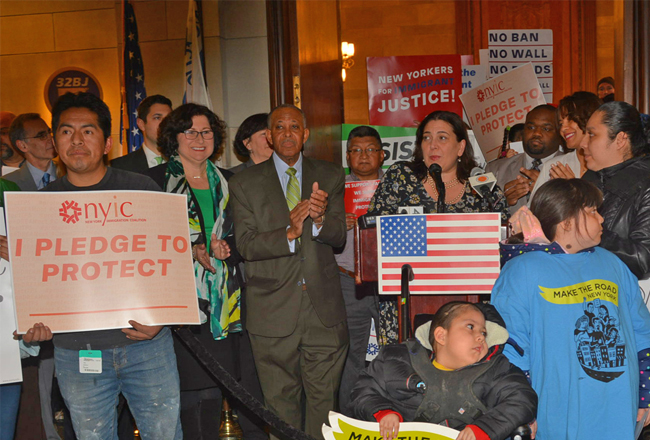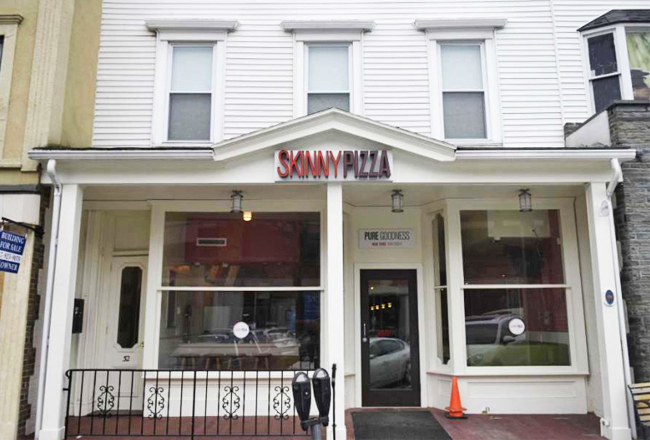The Westchester County Board of Legislators passed legislation that some members say will help protect immigrants who call Westchester their home.
By a vote of 11-3, legislators Monday night approved the Immigration Protection Act, which prevents Westchester County from using any of its resources to assist in federal investigations based on race, gender, sexual orientation, religion, ethnicity or national origin.

“We all have heard the story that immigrants come to the United States in pursuit of the American Dream,” said Legislator Virginia Perez, a Yonkers Democrat. “Targeting them simply because of their immigration status while disregarding their contributions to this country not only is wrong, but also unbecoming of a society like ours.”
County Legislator Catherine Borgia, an Ossining Democrat, said the act enhances safety in Westchester County by increasing trust and cooperation between county employees, particularly law enforcement, and residents.
“This is a bill that improves every Westchester resident”™s public safety,” Borgia said during a rally held prior to the board”™s vote. “It improves our sense of community. It helps people not live in the shadows of fear and confusion and mistrust.”
The Immigrant Protection Act follows a model laid out by state Attorney General Eric Schneiderman aimed at protecting immigrant communities. The model provisions clarify that local law enforcement can limit their participation in federal immigration enforcement activities in several ways: by refusing to enforce federal nonjudicial civil immigration warrants; by denying federal requests to hold uncharged individuals in custody more than 48 hours; by limiting access of federal agents to individuals currently in custody; and by limiting information-gathering that will be used exclusively for federal immigration enforcement.
The measure was passed by all present members of the Democratic Caucus, who were joined by Yonkers Republican David J. Tubiolo.
Democratic members Mike Kaplowitz and Lyndon Williams were absent from Monday”™s vote.
However, opponents of the legislation believe the Immigrant Protection Act will designate Westchester as a “sanctuary” county.
Sanctuary jurisdictions are those that have ordinances or practices that obstruct immigration enforcement and shield criminals from U.S. Immigration and Customs Enforcement. Sanctuary jurisdictions run the risk of losing access to certain federal law enforcement grants if they prohibit officials from communicating with ICE.
“Despite its name, the Immigrant Protection Act does not provide new protections for our immigrant community,” Republican legislators John Testa and Margaret Cunzio, said in a joint statement opposing the legislation. “In fact, the IPA, as it is written, protects criminals while putting innocent people in greater danger.”
The Immigrant Protection Act was first introduced to the board in February of last year, and the bill”™s language was the subject of months of back-and-forth negotiations between Republican and Democratic members.
Legislators ultimately passed the Immigrant Protection Act by a vote of 10-5 on Aug. 7. However, just hours after the act was passed by the Board of Legislators, then-County Executive Robert P. Astorino announced his own plans to veto the legislation, saying the act would severely restrict how local law enforcement officials communicate with federal agencies.
An attempt to override the veto failed by a single vote by the Board of Legislators in September.
“Moving this legislation, which had been thwarted by the prior county executive, was a priority for the new board, and I commend all those who were involved in crafting this latest version,” said board Chair Ben Boykin.
Local community groups that work with the county”™s immigrant population cheered the passage of the Act.
“Federal law enforcement is not the job of county personnel,” said Vanessa Merton, director of the Immigration Justice Clinic at Pace University. “County agencies should not be required to enforce federal immigration regulations any more than they enforce federal tax regulations.”
Carola Otero Bracco, executive director of Neighbors Link, a Mount Kisco nonprofit that assists immigrants, said the act is an important measure for the entire county.
“We are committed to our unyielding conviction to celebrate and cultivate diversity and inclusion, and the passing of this strong legislation is a key step toward that vision,” said Bracco.
The act will now head to County Executive George Latimer for his approval.
“This legislation in no way goes against federal law, and in no way will allow criminals to be harbored. To say otherwise is simply not true,” Latimer said in a statement following the vote. “This legislation goes to the heart of protecting good honest citizens in their home.”




















So tell us what does it do for anyone other than to pander for votes.